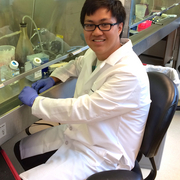Bing Shui '16 (China), a rising junior majoring in biology, is one of forty undergraduate students accepted into the 2014 Harvard Stem Cell Institute (HSCI) Internship Program, which provides participants with a challenging summer research experience in a cutting-edge stem cell science laboratory.
Since early June, Shui has been working in the Boston Children’s Hospital laboratory of HSCI Affiliated Faculty member Xi He, PhD, known for his research on cell-to-cell communication. Shui’s project this summer is to study how a newly discovered protein controls how genes function in intestinal stem cells and colorectal cancer cells.
“Throughout this internship, I am learning from both researching and living in Boston,” Shui said. “Academically, working on my own science project that is part of cutting-edge research is fascinating, and personally, living in a big city all by myself is also a huge challenge.”
“I first experienced that science doesn’t always follow your expectations when my project got stuck on the first step for five weeks,” he added. “I realized that science is also about those unexpected situations, but the internship taught me how to identify the problem and how to use outside resources to solve it.”
Over the course of the 10-week program, interns participate in a stem cell seminar series, a career pathways presentation, and a weekly stem cell companion course. They present their summer research findings, both orally and in poster format, at an end-of-program symposium.
“This program represents an exciting opportunity for undergraduates to gain hands-on experience in stem cell research while working in an HSCI laboratory under the supervision of an experienced researcher,” said HSCI Internship Program co-director M. William Lensch, PhD.
The Harvard Stem Cell Institute is a collaborative of more than 1,000 leading scientists, postdoctoral fellows, graduate students, and undergraduate students who are affiliated with one or more of the University’s schools and affiliated hospitals and medical institutions, and are working to advance the understanding and use of stem cells in basic research and regenerative medicine.



